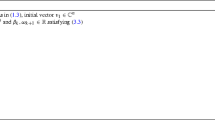Abstract
The quadratic programming aspects of a full space successive quadratic programming (SQP) method are described. In particular, fill-in, matrix factor and active set updating, numerical stability, and indefiniteness of the Hessian matrix are discussed in conjunction with a sparse modification of Bunch and Parlett factorization of symmetric indefinite (Kuhn-Tucker) matrices of the type often encountered in optimization. A new pivoting strategy, called constrained pivoting, is proposed to reduce fill-in and compared with complete, partial and threshold pivoting. It is shown that constrained pivoting often significantly reduces fill-in and thus the iterative computational burdens associated with the factorization and solution of Kuhn-Tucker conditions within the QP subproblem. A numerical algorithm for updating the lower triangular and diagonal factors is presented and shown to be very fast, usually requiring only about 5% of the cost of refactorization. Two active set strategies are also presented. These include the options of adding inequalities either one or several at a time. In either case, the effects on matrix factor updating is shown to be small. Finally, a simple test is used to maintain iterative descent directions in the quadratic program. Our sparse symmetric indefinite QP algorithm is tested in the context of a family of SQP algorithms that include a full space Newton method with analytical derivatives, a full space BFGS method and a Range and Null space Decomposition (RND) method in which the projected Hessian is calculated from either analytical second derivatives or the BFGS update. Several chemical process optimization problems, with small and large degrees of freedom, are used as test problems. These include minimum work calculations for multistage isothermal compression, minimum area targeting for heat exchanger networks, and distillation optimizations involving some azeotropic and extractive distillations. Numerical results show uniformly that both the proposed QP and SQP algorithms, particularly the full space Newton method, are reliable and efficient. No failures were experienced at either level.
Similar content being viewed by others
References
J.R. Bunch and L. Kaufman, A computational method for the indefinite quadratic programming problem, Lin. Alg. Appl. 34(1980)341.
J.R. Bunch and L. Kaufman, Some stable methods for calculating inertia and solving symmetric linear systems, Math. Comp. 31(1977)163.
J.R. Bunch and B.N. Parlett, Direct method for solving a symmetric indefinite system of linear equations, SIAM J. Num. Anal. 8(1971)639.
G.C. D'Couto, Issues in local process optimization, M.S. Thesis, Clarkson University (1990).
P.E. Gill, W. Murray, M.A. Saunders and M.H. Wright, Inertia-controlling methods for general quadratic programming, SIAM Rev. 33(1991)1.
P.E. Gill and W. Murray, A Schur-complement method for sparse quadratic programming, Tech. Rep. SOL 87-12(1987).
P.E. Gill, W. Murray, M.A. Saunders and M.H. Wright, Sparse matrix methods in optimization, SIAM J. Sci. Stat. Comp. 5(1984)562.
P.E. Gill and W. Murray, Numerical stable methods for quadratic programming, Math. Prog. 14(1978)349.
S.P. Han, Superlinearly convergent variable metric algorithms for general nonlinear programming problems, Math. Prog. 11(1976)263.
J.W.H. Liu, A partial pivoting strategy for sparse symmetric matrix decomposition, ACM Trans. Math. Software 13(1987)173.
A. Lucia and J. Xu, Chemical process optimization using Newton-like methods, Comp. Chem. Eng. 14(1990)119.
J.J. Moré and D.C. Sorensen, Newton's method, Report ANL-82-8, Argonne National Laboratory, Argonne, IL (1982).
L.M. Naphtali and D.P. Sandholm, Multicomponent separation calculations by linearization, AICHE J. 17(1971)148.
J. Nocedal and M.L. Overton, Projected Hessian updating algorithms for non-linearly constrained optimization, SIAM J. Num. Anal. 22(1985)821.
M.J.D. Powell,A Fast Algorithm for Nonlinearly Constrained Optimization Problems, ed. G.A. Watson (Springer, Berlin, 1978).
J.M. Prausnitz, T.F. Anderson, E. Grens, C. Eckert, R. Hsieh and J.P. O'Connell,Computer Calculations for Multicomponent Vapor-Liquid and Liquid-Liquid Equilibria (Prentice-Hall, NJ, 1980).
S. Vasantharajan and L.T. Biegler, Large-scale decomposition for successive quadratic programming, Comp. Chem. Eng. 12(1988)1087.
S. Venkataraman and A. Lucia, Solving distillation problems by Newton-like methods, Comp. Chem. Eng. 12(1988)55.
R.B. Wilson, A simplicial method for concave programming, Ph.D. Thesis, Harvard University (1963).
T.F. Yee, I.E. Grossmann and Z. Kravanja, Simultaneous optimization models for heat integration. I. Area and energy targeting and modelling of multi-stream exchangers, Comp. Chem. Eng. 14(1990)1151.
Author information
Authors and Affiliations
Rights and permissions
About this article
Cite this article
Lucia, A., Xu, J. & D'Couto, G.C. Sparse quadratic programming in chemical process optimization. Ann Oper Res 42, 55–83 (1993). https://doi.org/10.1007/BF02023172
Issue Date:
DOI: https://doi.org/10.1007/BF02023172




